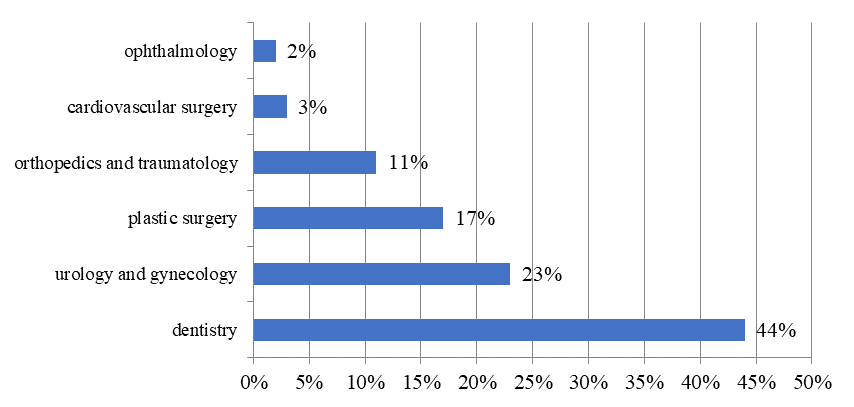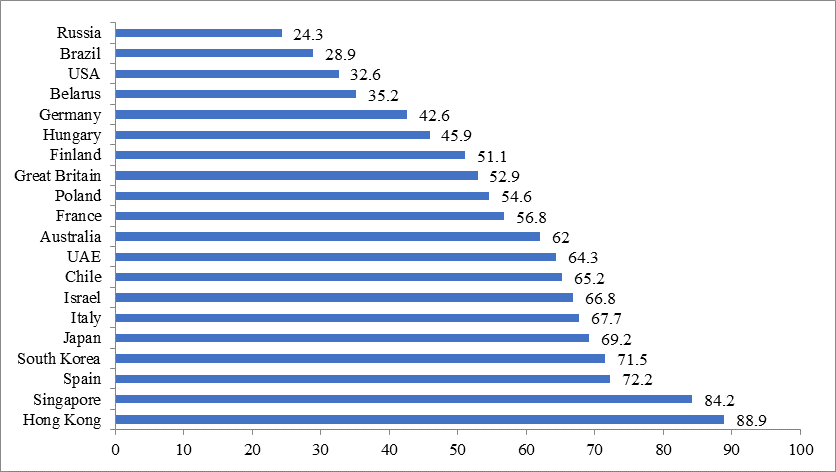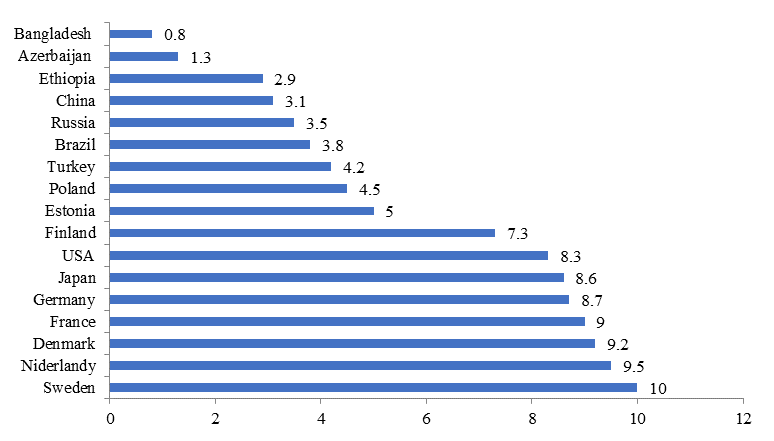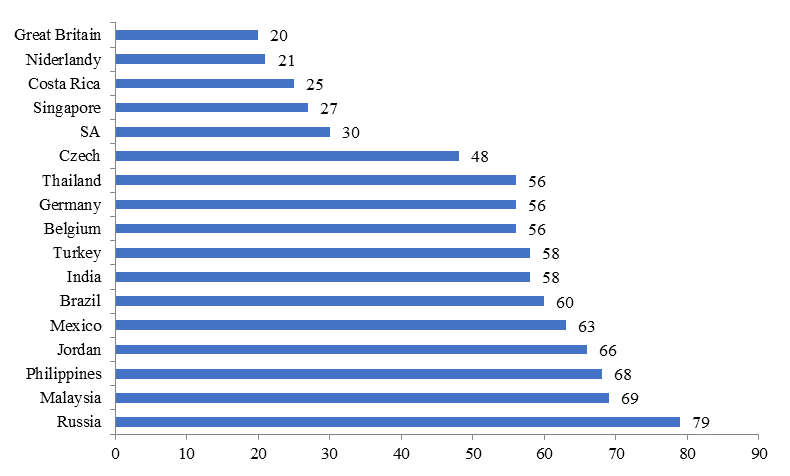Abstract
The article explores the role and importance of medical tourism as a possible driver of socio-economic development of the economy. The authors analyze the attractiveness of medical tourism for the Russian economy. The current situation in the field of medical tourism is described. The authors demonstrated the medical services demanded by foreign tourists provided by Russian medical institutions. The most promising directions for the development of this sphere are identified. The authors propose to consider some important challenges as potential opportunities. The necessity of acquiring additional competencies by medical personnel is emphasized. It was concluded that it is necessary to intensify the media promotion of domestic medical services abroad, to attract specialized intermediary organizations that form the base of potential consumers from other countries. The measures necessary to build up Russia's capabilities as an attractive destination for tourists who want to receive medical services on its territory are described, including medical visas for consumers from abroad, as well as the organization of the integrated provision of services, in which transportation, accommodation, meals, rehabilitation and leisure services accompany the direct treatment. These measures will contribute to the socio-economic transformation of the regional economy.
Keywords: Medical tourismdevelopment drivercomprehensive services
Introduction
The development of such a field as medical tourism is a significant source of income for many countries of the world, which is relevant, for example, for Israel, Thailand, Singapore. According to expert estimates, in 2017 the amount of income from medical tourism exceeded $ 15 billion ( Revenues from medical tourism in 2017 reached $ 15 billion, 2017). Significant revenues from this area are a tool for transforming national economies. This is of potential interest for Russia, where the territories do not develop equally, and there is an objective need to raise funds for the positive evolution of regional economies.
Taking into consideration, a consistently high-quality level of medical services provided in medical institutions in Russia, this area can act as a driver of the socio-economic development of regional economies. We also emphasize that medical tourism is of interest to Russia, since it is a growing market in the world, and in our country the segment of providing medical services is sufficiently developed in order to be potentially attractive to foreign tourists. As an update of this direction, we note that back in 2016, the volume of the world tourism market amounted to 439 billion US dollars and more than 11 million people carried out treatment abroad ( Goroshko & Patsala, 2018). Experts predict the growth of this market annually to 25% and say that about 4% of the population will receive medical services outside the country of permanent residence ( The Russian market of inbound medical tourism is on the rise stage, 2017). Accordingly, by 2025, this market is projected to increase to 3 trillion. USD ( Medical tourism: why are foreigners treated in Russia, and Russians abroad. Electronic resource, 2018).
Problem Statement
Speaking about the transformative role of medical tourism in Russia and its entry component, it is necessary to understand that, despite the objectively strong positions of Russian medicine, this is not always the factor leading to the choice of consumers. So, when choosing a place to receive medical services, potential consumers are aimed at collecting complete information, which, inter alia, is based on existing rating systems of both national health systems in general and certain clinics in particular.
In this regard, the tourism index proposed by the International Health Research Center for Health has been developed and is used to evaluate destinations offering medical tourism services and health, as well as unhindered access to health services. Currently, Russia is significantly inferior to other players in the medical tourism market, occupying only about 0.45%. In the indicated index Russia takes the 34 th position out of 41 ( Radchenko, 2017). This creates objective difficulties for the mass attraction of medical tourists from abroad, which is necessary for the transformation of inbound medical tourism into a tool for transforming the economy, attracting investment in the development of territories and creating new jobs for them in the health sector and other related industries (hotel, catering , transport, leisure). All this implies the need to study the current state and assess the “starting position” in order to understand how to change the current situation on the basis of existing advantages and how to mitigate the shortcomings.
Research Questions
There are many opinions which areas of medical tourism are necessary and expedient to develop and which segments of consumers can reasonably be expected in Russian conditions. There is also an opinion about the insufficient financing of the healthcare sector in Russia and the need to position it on the world market as a place to provide high-quality services at a price much lower than in other countries providing such services. Such a variety of expert points of view involves the study of the issues of the existing popular directions of inbound medical tourism in Russia, determining the circle of consumers of these services, detailing the difficulties and challenges in the development of this direction of healthcare, as well as clarifying the necessary measures for transforming inbound medical tourism into a transforming tool of the modern economy.
Purpose of the Study
In the defined analytical context, the purpose of this study is to determine the set of measures necessary to build up such a component as inbound economic tourism, which can become a driver of the socio-economic transformation of territories in Russia.
Research Methods
The research methodology is based on such general scientific methods as: analysis, comparative analysis and synthesis, generalization, a systematic approach, collecting facts from official sources, evaluating the opinions of experts and rating results of national health systems.
In this regard, we will note that despite the lack of a leading position in medical tourism at the moment, the depreciation of the ruble against the dollar and the euro is in favor of acquiring medical services in Russia, along with their qualitative parameters that are not inferior to world analogues. In the recent past, tourists who wish to receive medical services in Russia were primarily attracted to such an area as dentistry. To date, the range of interests has expanded including services in oncology, eye microsurgery, cardiology, joint prosthetics and in vitro fertilization ( To be treated in Russia. Are there any prospects for medical tourism, 2017)?
At present services in aesthetic medicine and reproductive medicine are of great interest to foreigners. In vitro fertilization (IVF) procedures in Europe are two or more times more expensive than in Russia. A number of European countries have age restrictions or difficulties in obtaining this service under a quota or medical insurance. In Russia, this service is offered legally and at a price acceptable to consumers from Europe ( Foreigners go to Russia for artificial insemination. MedicForum, 2015). Aesthetic medicine services, for example, blepharoplasty, breast correction, rhinoplasty in Russia are 30-40% cheaper than in other countries, for example, in the United States, while the services are provided by highly professional specialists ( The West has embraced the fashion for plastic surgery in Russia. Portal Aesthetic Medicine, 2020).
Almost all medical services, including high-tech, in Russia are much more affordable than in clinics in Germany, Italy, Israel and the United States. For example, radiation therapy courses in Russia can be 20 times cheaper than their counterparts in the United States, as well as services for laser vision correction. Coronary bypass surgery in Russia is more affordable at a price of 18-20 times. A full diagnostic examination is also significantly more affordable in terms of price gradient, namely, it is 3-6 times cheaper without losing the quality of the diagnostics being performed ( To be treated in Russia. Are there any prospects for medical tourism, 2017)?
Describing the key areas of medical tourism in terms of its inbound directions, the following data can be cited (Figure

The incoming flow of tourists focused on receiving medical services in Russia is 60% composed of former residents of the Soviet Union and members of their families, as they are aware of the qualitative parameters of medicine in Russia and do not have language barriers to visiting Russian clinics ( Nikitina, 2018). About 8% of incoming tourists of this kind come from the Czech Republic, Latvia and Bulgaria ( Russian Agency for Medical and Social Information, 2016).
The prevailing locations in Russia that attract tourists from abroad for treatment are Moscow, where about 60% of those who wish are served, and St. Petersburg, which accounts for 30% of this inbound flow. Also, about 5% of the total falls to the Far East and Siberia, while other regions jointly serve 5% of medical tourists ( Arkharova, 2018).
Findings
In addition to a stable position when working with the existing segments of inbound medical tourists, there appeared certain difficulties in Russia including the ones associated with the information security of the services provided, transport accessibility, as well as visa restrictions and lack of language training for medical and paramedical personnel.
A serious challenge is also the weak representativeness of domestic healthcare organizations in international rating systems and the assessment of the quality of medical services and a low (possibly not true) assessment of the effectiveness of the healthcare system in the country. An example of this kind is the Bloombergs rating for evaluating the effectiveness of existing national health systems (Figure

It is seen that according to the data presented, Russia occupies a modest place by this criterion, however, the US position in this matter also seems not high according to this assessment. At the same time the position of inbound tourism in the United States will not change this assessment, since, for example, in recent years, 18 scientists from the USA became Prize winners in physiology and medicine. Also, about 50% of new products on the global pharmacological market belong to companies from the United States ( Nikitina, 2018). In relation to Russian inbound tourism, such ratings create problems and reduce the intentions of target audiences to receive medical services in Russian clinics. In addition, in Russia government spending on the health sector remains almost two times lower than in most European countries, amounting to about 3.5% of GDP (Figure

In view of the current situation, determined both by the volume of financing and the lack of representativeness in high positions in the rating systems for evaluating medical tourism in the world, Russia is currently forced to position itself as an attractive destination in relation to medical tourism services, offering standardized quality medical services at a price much more affordable than in the flagship world destinations of this kind. So, for example, according to the criterion of reducing prices for medical services rendered, Russia leads in comparison with other countries that are also focused on reducing costs for this component (Figure

It seems to us that in order to increase Russia's popularity as receiving medical services for foreign citizens, in addition to the price factor and the existing high enough quality of their delivery, it is necessary to organize a promotion system that involves cooperation with organizations that help consumers in the place of receiving medical services. These can be specialized travel companies, special medical call centers that take care of the coordination of the full cycle of patients staying from abroad for treatment.
No less significant for attracting medical tourists from abroad is the offer of a comprehensive service package to clients, including flight services, transfer to the place where the patient received the service, assistance in choosing accommodation for accompanying people, as well as meals, including specialized and rehabilitation services after treatment.
It also raises the question of the introduction of long-term medical visas, allowing to undergo a full examination and treatment. This practice is actively used in Germany, which helps to attract patients from various countries to receive medical services there. The key to the development of the field of medical inbound tourism are personnel issues, namely the presence of language competencies among doctors and paramedical personnel. The same requirements for the availability of language support are presented in this case to the websites of medical organizations and the work of the hotline advising those wishing to receive medical services.
Certain risks for the further development of Russia, as a potentially interesting “player” in the inbound medical tourism market, bear the focus of a number of states on increasing healthcare costs. Thus, by 2050, OECD countries plan to spend more than 20% of GDP on health ( Sigrist, 2006). For example, the United States and Switzerland announce their willingness to spend 50% of GDP on health care ( Sigrist, 2006). This situation determines the need for Russia to invest heavily in this segment, as well as focus on innovations in medicine with a simultaneous strategy of offering affordable prices. Such tactics can ultimately contribute to the socio-economic transformation of regions.
Another challenge for Russia in the segment of medical tourism development is the active introduction of online platforms and the manifestation of the digital revolution in this sector in Europe and several other countries. This means that the existing developed digital services allow you to contact the medical institution of interest, defined by the attending physician, to translate all the necessary documentation, to receive the services of flight, accommodation and post-treatment rehabilitation. In Russia, these changes are also recognized, which is confirmed by the initiatives on the “Digital pumping of the healthcare sector”, implemented in various regions of our country. However, at present, the significant development of digital healthcare has manifested itself mainly in Moscow, St. Petersburg and Tatarstan ( Digital Russia: a new reality, 2017). For a comprehensive effect in terms of the development of inbound medical tourism, such solutions should prove themselves in full in most regions of the country.
Conclusion
We believe that it is advisable to consider these challenges and difficulties as opportunities and hidden potential that can be realized when certain organizational and managerial actions are taken that lead to a positive result.
Accordingly, despite the difficulties that have manifested, Russia has a chance to occupy a worthy position in the world market of inbound medical tourism, which will contribute to positive transformations of the socio-economic situation in the regions by raising funds for the development of the regional economy, and increasing quality health services that will be affordable and local residents, as well as job creation in the medical sector and a number of related industries.
This implies the implementation of systematic, coherent and comprehensive measures related to legislation (introduction of tourist visas), pricing policy (determining the ratio of prices for services in accordance with their quality and the demands of attracted consumer audiences), increasing budget expenditures on health care (from the point of view of priority services), language training of medical personnel, updating infrastructure (which accompanies the receipt of services), creating digital services conducive to receiving integrated services, conjugated with treatment (transport, meals, accommodation, leisure, rehabilitation opportunities), as well as marketing promotion of Russian medical services abroad to attract new consumers.
References
- Arkharova, I. (2018). Medical tourism in Russia more than doubled. TURPROM Information Group. https://www.tourprom.ru/news/37673/
- Bloomberg: World Ranking of Health Systems Performance in 2016 (2016). Humanitarian technologies: an analytical portal. http://gtmarket.ru/news/2016/10/08/7306
- Digital Russia: a new reality (2017). Digital / McKinley Panel Expert Report, July 2017. https://roscongress.org/materials/tsifrovaya-rossiya-novaya-realnost/
- Foreigners go to Russia for artificial insemination. MedicForum (2015). https://www.medikforum.ru/news/health/pregnancy/43052-inostranki-edut-zaiskusstvennymoplodotvoreniem-v-rossiyu.html
- Goroshko, N. V., & Patsala, S. V. (2018). Russia in the global medical tourism market. Electronic scientific and methodological journal of the Omsk State Agrarian University, 1(12). http://ejournal.omgau.ru/images/issues/2018/1/00493.pdf
- Kornyushin, V. (2013). Medical tourism: a growing market for great investment opportunities. In GAAP.RU: Theory and practice of management accounting. https://gaap.ru/articles/Meditsinskiy_turizm_rastushchiy_rynok_bolshikh_investitsionnykh_voz mozhnostey/
- Medical tourism: why are foreigners treated in Russia, and Russians abroad. Electronic resource (2018). https://www.forbes.ru/biznes/365591-medicinskiy-turizm-pochemu-inostrancy-lechatsya-v-rossii-rossiyane-za-granicey
- Nikitina, O. A. (2018). Modern trends and challenges in the development of medical tourism: world experience. PSE, 4, 68. https://cyberleninka.ru/article/n/sovremennye-tendentsii-i-vyzovy-v-razvitii-meditsinskogo-turizma-mirovoy-opyt
- Radchenko, T. (2017). Diagnosis of a tourist: For the time being, they mainly go to Russia from the CIS countries for treatment. Rossiyskaya Gazeta, 7433, 267. https://rg.ru/2017/11/23/kakrazvivat-v-rossii-medicinskij-turizm.html
- Revenues from medical tourism in 2017 reached $ 15 billion (2017). https://medvestnik.ru/content/news/Dohody-ot-medicinskogo-turizma-dostigli-v-2017-godu-15-mlrd -dollarov.html
- Russia and the countries of the world (2016). Statistical Digest. Rosstat.
- Russian Agency for Medical and Social Information (2016). https://riaami.ru/2016/08/rossiya-okazalasna-34-m-meste-v-rejtinge-napravlenij-meditsinskogo-turizma/
- Sigrist, S. (2006). Future perspectives of the health care market, Gottlieb Duttweiler Institute. GDI on behalf of or in the Federal Department of Home Affairs, Bern.
- The Russian market of inbound medical tourism is on the rise stage (2017). Pharmaceutical Bulletin. https://pharmvestnik.ru/publs/lenta/v-rossii/rossijskijrynok-2017vjezdnogo-meditsinskogo-turizma-naxoditsja-na-stadii-podjema.html#.WmLaNExuKmS.
- The West has embraced the fashion for plastic surgery in Russia. Portal Aesthetic Medicine (2020). http://novmed.net/novosti/507-zapad-okhvatila-moda-na-plasticheskie-operatsiiv-rossii.html
- To be treated in Russia. Are there any prospects for medical tourism (2017). Forbes. http://www.forbes.ru/biznes/355967-lechitsya-v-rossii-est-li-perspektivy-u-medicinskogoturizma 2017
Copyright information

This work is licensed under a Creative Commons Attribution-NonCommercial-NoDerivatives 4.0 International License.
About this article
Publication Date
21 October 2020
Article Doi
eBook ISBN
978-1-80296-089-1
Publisher
European Publisher
Volume
90
Print ISBN (optional)
-
Edition Number
1st Edition
Pages
1-1677
Subjects
Economics, social trends, sustainability, modern society, behavioural sciences, education
Cite this article as:
Bondarenko, V. A., Przhedetskaya, N. V., Afanaseva, M. F., & Poluyanova, N. V. (2020). Medical Tourism As A Driver Of Socio-Economic Development Of The Economy. In I. V. Kovalev, A. A. Voroshilova, G. Herwig, U. Umbetov, A. S. Budagov, & Y. Y. Bocharova (Eds.), Economic and Social Trends for Sustainability of Modern Society (ICEST 2020), vol 90. European Proceedings of Social and Behavioural Sciences (pp. 597-604). European Publisher. https://doi.org/10.15405/epsbs.2020.10.03.68

